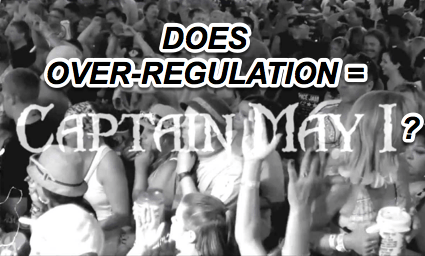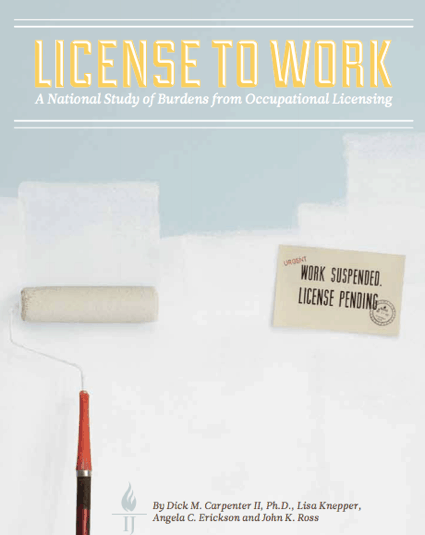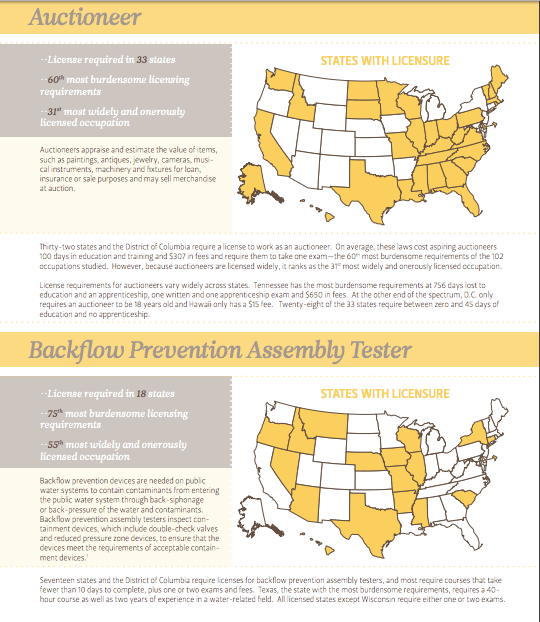
In the U.S., a number of professions and businesses are regulated to varying degrees. While some are obviously necessary, others present questions – and responses – from individuals and businesses alike, who wonder if having to play the game of “captain may I?” is meant to help or hurt them.
Research from the Brookings Institute takes a look at the logic, and the lack of it in some instances, as it relates to licensing.
“It is important to realize that occupational licenses are not mere state-sponsored certificates to signal that workers have completed some level of training; occupational licensing laws forbid people from practicing in their occupation without meeting state requirements,” the Institute said in a report.
“If the rationale for licensing an electrician is to protect public safety, it is difficult to see what rationale supports licensing travel guides. Yet, twenty-one states require a license for travel guides. Among these, Nevada has created the highest hurdle: a person hoping to be a travel guide in that state must put in 733 days of training and shell out $1,500 for the license.”

Then, there’s the other side.
“There can be an obvious disconnect between the strictness of licensing regulations and the potential harm to consumer safety. For example, Michigan requires 1,460 days of education and training to become an athletic trainer, but just 26 to be an emergency medical technician (EMT). In fact, across all states, interior designers, barbers, cosmetologists, and manicurists all face greater average licensing requirements than do EMTs,” said the institute.
According to the Washington Times, special-interest groups often promote state licensing to benefit themselves at the expense of entrepreneurs, small-business owners and consumers.
And, it seems that this problem has exploded.
The percentage of U.S. workers who need government permission to practice their occupation has grown from 5 percent in the 1950s to nearly 30 percent today. Studies suggest this has caused 2.8 million fewer jobs in our economy and more than $200 billion in additional annual costs for consumers.

The Times points to an instance in Oregon, where licensing requirements can be enforced in ways that are unjust, and in the case of a licensing board just downright bizarre.
Recently, an Oregon resident spoke out publicly about the timing of the traffic lights in his city after his wife received a red light camera ticket. Based on calculations he had performed, he argued that the yellow light was too short.
For his trouble, he reportedly earned a $500 ticket from the state board of engineers for “the unlicensed practice of engineering.”
A Look from the Manufactured Housing Industry

As Daily Business News readers are already aware, job creation and economic growth are regularly noted in quarterly reports as a factor in manufactured housing sales. The adverse effects of regulation were pointed out in 2015, when award-winning writer Jan Hollingsworth recounted the story of the older gentleman, likely a farmer, in bib overalls who visited a manufactured home dealership in Kentucky.
After two hours of perusing the possibilities of different homes, he chose one. But when he asked the salesman for help in filling out the finance application, he was told federal regulations prevent manufactured home retailers from assisting customers. The man left, unhappy, and later found a salesman elsewhere who was willing to break the rules to provide the old farmer with what may be the house of his dreams.
The story highlights the incongruities written into the Dodd-Frank Act, and enforced by the Consumer Financial Protection Bureau (CFPB).
“He wasn’t asking the salesman to do anything that a real estate agent doesn’t do every day. It just makes no sense at all,” said Barry Noffsinger, a regional manager for CU Factory Built Lending, one of the nation’s leading MH lenders.

With compliance costs quadrupling in recent years for MH lenders, as Don Glisson, Jr., CEO of Triad Financial Services says, many small banks, credit unions and other MH lenders have shuttered their MH lending operations, leaving prospective buyers to rely on high interest loans, or else continue renting. ##
(Image credits are as shown above, and when provided by third parties, are shared under fair use guidelines.)

Submitted by RC Williams to the Daily Business News for MHProNews.
(Copyright Notice: This and all content on MHProNews and MHLivingNews always have been and are Copyrighted, © 2017 by MHProNews.com a dba of LifeStyle Factory Homes, LLC – All Rights Reserved. No duplication is permitted without specific written permission. Headlines with link-backs are of course ok. A short-quoted clip, with proper attribution and link back to the specific article are also ok – but you must send a notice to iReportMHNewsTips@mhmsm.com of the exact page you’ve placed/posted such a use, once posted.)

























